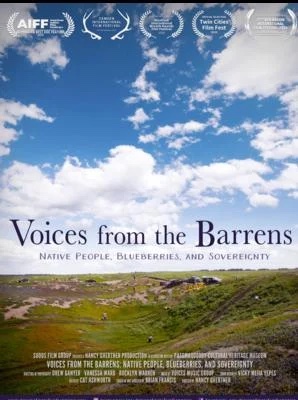Long before wild blueberries came into popular discourse as a nutrient-dense “superfood,” Indigenous people of the Northeast were benefiting from their taste, nutrition and cultural significance. “The blueberry represents a very important source of food. It was really important when all other resources were gone,” says Donald Soctomah, historic preservation officer for the Passamaquoddy Tribe.

Directed by Nancy Ghertner; produced by The Sodus Film Group
59 minutes
voicesfromthebarrens.com
“Voices from the Barrens” follows the tradition of blueberry raking at the Passamaquoddy Wild Blueberry Company, owned and operated by the Passamaquoddy Tribe of Sipayik, in what is now called Columbia Falls, Maine. Susie Marshall, a Mi’kmaq tribal elder from Eskasoni First Nation in what is now called Nova Scotia says, “People have been going for a long time to rake blueberries.”
This tradition brings rakers back to the Passamaquoddy Wild Blueberry Company time and time again. Family, old friends and new faces connect and reconnect in this space. Matthew Dana, of the Passamaquoddy Tribe, explains his emotional connection to this work: “It’s been a yearly traditional thing for us. We look forward to coming here every year and we love it. It’s hard work, but we love it. We love these lands. When we’re here it’s like home for us for the summer.”
However, that tradition has been and continues to be under threat. The land that the Passamaquoddy Wild Blueberry Company sits on is traditional Wabanaki territory, but was forcibly and violently taken from the tribes by white colonial settlers over the course of centuries. The Passamaquoddy, Penobscot and Maliseet tribes were allotted funds to buy back the lands that the company sits on through the Maine Indian Land Claims Settlement of 1980.
The film also touches upon the complex nature of border crossing for native peoples whose historical migratory patterns for the purposes of gathering wild, seasonal foods are disrupted by the continued colonization enacted by the government.
Another challenge to tradition is the swift takeover of mechanical harvesting. In recent years the company has gone from hundreds of hand-rakers to only a handful. This is felt deeply in the Wabanaki communities that have been raking berries for generations. While Brian Altvater, board president of the Passamaquoddy Wild Blueberry Company, would like to always have some hand-rakers, the company has had to move to primarily mechanized harvesting in order to keep up with competition and remain a viable producer in an already tumultuous wild-blueberry market. “We’re trying to do a balancing act. A balancing act between keeping all the rakers employed and getting the crop in, while realizing a profit,” says Altvater.
This challenge of balancing a very important cultural tradition with running a business is an ongoing one for the company. The company hopes that there will always be a need for hand-rakers for the sake of cultural identity alone, but also for the necessity of raking areas where mechanical harvesters cannot go.
The Passamaquoddy Wild Blueberry Company looks to the future as things continue to change in the market and climate. During a panel discussion of the film, co-hosted by MOFGA and Maine Farmland Trust on January 28, 2021, Altvater talked of certifying some of the blueberry barrens as organic and creating more value-added products to get the business name out into the world. I look forward to following and supporting the Passamaquoddy Wild Blueberry Company’s work in the years to come.
– Lucy Cayard, Portland, Maine
